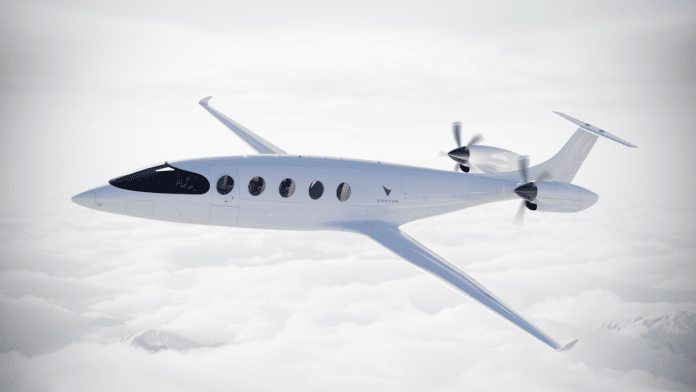Arlington-based start-up Eviation’s all-electric prototype passenger plane, Alice (registration N882EV) took off on its maiden test flight on Tuesday and landed successfully at Grant County International Airport (MWH) in Moses Lake, Washington.
Alice, which was first unveiled at the Paris Air Show in June 2019, is designed to accommodate nine passengers and two pilots up to about 500 miles (800 kilometers).
Powered by two, rear-mounted magniX650 electric motors, the plane airlifted off at 7:10 a.m. local time and traveled at an altitude of 3,500 feet (1,067 m) for its eight-minute inaugural flight after flying two circuits and peaked at 149 knots before safely landing at MWH.
Just before the test flight on Tuesday, the company behind the project had successfully completed several engine runs and high-rotation taxi tests last week.
Today, our all-electric Alice aircraft electrified the skies and embarked on an unforgettable world’s first flight. See Alice make history in the video clip below. We’re honored to celebrate this groundbreaking leap towards a more #sustainable future.#electricaviation pic.twitter.com/Q9dFoTPyiB
— Eviation Aircraft (@EviationAero) September 27, 2022
“Today we embark on the next era of aviation – we have successfully electrified the skies with the unforgettable first flight of Alice,” said Eviation President and CEO Gregory Davis.
“People now know what affordable, clean, and sustainable aviation looks and sounds like for the first time in a fixed-wing, all-electric aircraft. This ground-breaking milestone will lead innovation in sustainable air travel, and shape both passenger and cargo travel in the future.”
Davis further added, “We were able to complete our test plan exactly as we intended,” and it “was executed flawlessly by our test pilot Steve Crane.”
“It’s a fast airplane, real sleek,” Crane said after exiting the cockpit. “Very responsive and it did well, no surprises.”
The company says Alice produces no carbon emissions, is significantly quieter than a combustion engine, and costs a fraction to operate per flight hour compared to turboprops or light jets.
Designed by engineers in Washington state and Israel, the plane currently depends on 8,000 pounds of batteries. Alice is designed for both regional travel and cargo market with flights ranging from 150 miles to 250 miles (241 to 402 km) upon entry into service.
“The market that we’re looking at penetrating first is that 250-nautical-mile or less market,” noted Davis. “So we’re looking at developing an airplane that will fly one to two hours — 150 to 250 nautical miles with reserve — which is typical for that segment.”
According to Eviation’s stats, Alice’s maximum useful load would be 2,500 to 2,600 pounds, and its maximum operating speed would be 260 knots (300 mph). In comparison to commercial jets, the company claimed that the electric aircraft could reduce maintenance and operating costs by up to 70 percent.
Further, the max take-off weight (MTOW) has increased from 14,700 lb (6,668 kg) to 18,400 lb (8,346 kg). It will be capable of carrying 2,500 lb (1,134 kg) of payload.
However, Davis said the biggest challenge that Eviation has to overcome is the development of the batteries for which increasing energy density and reducing the weight of the batteries would be the top priority.
“The biggest tech challenge that Eviation has to overcome is the development of the batteries—that couldn’t be more clear. It’s looking at the evolution of the chemistry and the physics around those batteries. Of course, we are able to control how we integrate them, and how we optimize them from a design perspective for the aircraft, but we really do need the industry to boost the energy density at the unit level, depending on the actual form factor,” he said.
“Speaking on behalf of all electric aviation, we need companies to start looking at how they’re going to apply the architecture and the form of those batteries specifically for aerospace applications.”
The aircraft will be available in three configurations: Commuter, Executive, and Cargo. While the “commuter” configuration can accommodate nine passengers and a crew of two, the plane can also be converted into an “executive” configuration that seats six passengers. Further, the “cargo” configuration will offer a 450-cubic-foot, temperature-controlled cargo bay.
Eviation hopes to get Alice fully certified by 2024. Currently, the company is taking reservations for Alice, and it plans to start deliveries in 2026. Cape Air and Global Crossing Airlines have bought 75 and 50 Alice electric aircraft, respectively, while DHL Express has ordered 12 aircraft in cargo configuration in August 2021.

